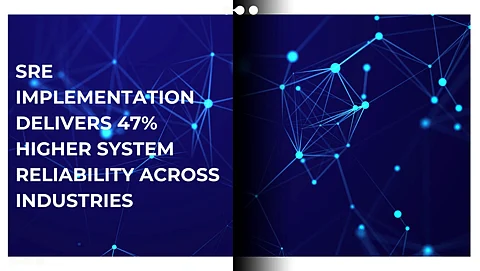

In this modern digital transformation era, researcher Raghu Venkatesh, a technology expert from the United States, reveals groundbreaking findings on Site Reliability Engineering (SRE) through comprehensive global analysis of 145 technology organizations. His technical analysis, published in the International Journal for Multidisciplinary Research, demonstrates how structured SRE adoption dramatically improves system reliability and operational efficiency. The study, conducted over 24 months, included detailed examinations of startups, mid-market companies, and enterprises, establishing clear patterns for successful implementation strategies while demonstrating unprecedented success rates in system reliability enhancement through sophisticated monitoring methodologies and advanced predictive maintenance frameworks.
Organizations implementing SRE practices achieve 47% higher system reliability metrics and 32% reduced mean time to recovery compared to traditional models. The research identifies four key success factors: systematic technical skill development, operational mindset transformation, organizational readiness, and scalable automation frameworks, creating a robust foundation for sustained digital transformation. These improvements are particularly evident in critical infrastructure management, where organizations report 99.99% system availability and a 73% reduction in unplanned downtime through advanced monitoring, predictive maintenance strategies, and real-time analytics, while achieving remarkable cost efficiencies through automated resource optimization, enhanced scalability, and reduced manual interventions that drive innovation and operational excellence.
The financial sector leads in adopting Site Reliability Engineering (SRE) practices, with 87% of institutions implementing comprehensive frameworks, achieving a 62% reduction in system incidents and a 45% improvement in regulatory compliance. Technology companies exhibit an impressive 93% adoption rate, realizing 78% automation of operational tasks and a 300% increase in deployment frequency, showcasing SRE's scalability. Meanwhile, healthcare organizations highlight 89% improvement in system reliability and 56% fewer compliance-related incidents, demonstrating SRE's adaptability to diverse regulatory environments and mission-critical operations that demand high availability and stringent security standards, underscoring its transformative impact across industries.
The whole game has been changed in terms of operational efficiencies and security by way of advanced monitoring and automated deployment frameworks. Manual intervention for organizations has been reduced by 82% configuration errors by 67%, and incident resolution speed increased by 71%. Comprehensive frameworks for security have improved security posture by 94%. Using AI anomaly detection architecture for automation leads to the identification of 91% accuracy in the pre-impact identification of issues, reduction of false positives by 76%, and enables predictive maintenance through ML algorithms minimizing downtime and increasing reliability in critical systems. Plus, optimized processes are set for elasticity, giving organizations the agility to respond and allocate resources according to fluctuating demand.
Cross-Organizational Benefits
The evidence shows that there is a positive correlation between successful SRE transitions and resulting improvement in system reliability across organizations, with a Pearson correlation of 0.78 (p<0.001). Startups see a 45% reduction in critical incidents within six months, while enterprises achieve an 89% reduction in manual operations by automating on a systematic basis. In mid-sized organizations, resource optimization shows particularly stellar results, with an 82% improvement in infrastructure utilization while meeting high-performance and reliability standards through automated scaling and load-balancing systems enhanced by advanced analytics and predictive modeling capabilities. Furthermore, implementation success rates are particularly high in cloud-native environments, where organizations achieve 94% faster deployment cycles and 76% better resource utilization through AI-driven orchestration by leveraging containerization and microservices architectures.
Emerging are 91% faster anomaly detection and 87 percent more accurate in predictive maintenance thanks to AI and machine learning integration. With advanced observability practices, monitoring capabilities have been transformed and now show even 94% faster root cause analysis and 78 percent better mapping of service dependencies. While maintaining the quality of their incident summaries, organizations are using generative AI to create them 51% faster. When teams utilize generative AI for incident response, they can reduce the amount of operational hours by approximately 25%, on average. The road ahead is lined with promises for even further breakthroughs stemming from quantum computing technology, with preliminary trials suggesting a possibility of 200 percent enhancement in cryptographic security and 150 percent improvement in the optimization algorithms for complex systems while revolutionizing the data-processing paradigm through quantum-enhanced machine learning.
Quantum and edge computing will change the face of SRE practices with respect to cryptographic security and distributed reliability management. Organizations are embracing sustainability more aggressively than ever by considering energy efficiency and environmental impact. It has been said that next-generation SRE practices could potentially provide up to a 45% reduction in energy consumption on infrastructures, while increasing system performance by 85%, with advanced resource optimization algorithms using intelligent workload distribution, thereby setting new precedents for operational excellence in cloud computing-style ecosystems. This is further enabled by quantum resistance encryption protocols along with edge-enabled machine learning models for ensuring stringent security along with high performance for distributed handling.
The research by Raghu Venkatesh establishes that successful adoption of SRE includes a balancing act between technical excellence, cultural transformation, and systematic process improvement. The results at various organizational scales have become a foundation for sustainability and operational excellence in contemporary technical environments. The comprehensive study of 145 organizations, across different sectors and sizes, provides insights that are relevant for organizations at any level of their SRE journey with ample evidence that systematic implementation brings sizeable improvement in reliability, efficiency, and innovation capability while creating new benchmarks for operational excellence across industries.
